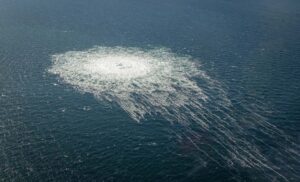STOCKHOLM/COPENHAGEN — Europe was investigating on Tuesday what Germany, Denmark, and Sweden said were attacks which had caused major leaks into the Baltic Sea from two Russian gas pipelines at the center of an energy standoff.
But it remained far from clear who might be behind the leaks that were first reported on Monday or any foul play, if proven, on the Nord Stream pipelines that Russia and European partners spent billions of dollars building.
German Economy Minister Robert Habeck told business leaders the leaks were due to targeted attacks on the infrastructure and Berlin now knew for sure “that they were not caused by natural occurrences or events or material fatigue.”
Sweden’s and Denmark’s prime ministers said the leaks were clearly caused by deliberate actions, with information suggesting likely sabotage, while Poland’s premier blamed sabotage, without citing evidence.
Russia, which slashed gas deliveries to Europe after the West imposed sanctions over Moscow’s invasion of Ukraine, also said sabotage was a possibility and that the leaks undermined the continent’s energy security.
A senior Ukrainian official called the incident a Russian attack to destabilize Europe, without giving proof.
“We see clearly that it’s an act of sabotage, related to the next step of escalation of the situation in Ukraine,” Polish Prime Minister Mateusz Morawiecki said at the opening of a new pipeline between Norway and Poland.
Sweden’s Prime Minister Magdalena Andersson told a news conference that two blasts had been detected in relation to the leaks and though this did not represent an attack on Sweden, her government was in close contact with partners such as NATO (North Atlantic Treaty Organization) and neighbors such as Denmark and Germany concerning the developments.
Seismologists in Denmark and Sweden said they had registered two powerful blasts on Monday in the vicinity of the leaks.
“The signals do not resemble signals from earthquakes. They do resemble the signals typically recorded from blasts,” the Geological Survey of Denmark and Greenland (GEUS) said.
And seismologists at Sweden’s Uppsala University, which cooperates with GEUS, said the second, bigger explosion “corresponded to more than 100 kilos (kg) of dynamite,” adding the blasts were in the water not under the seabed.
The Nord Stream pipelines have been flashpoints in an escalating energy war between capitals in Europe and Moscow that has damaged major Western economies, sent gas prices soaring and sparked a hunt for alternative supplies.
“Germany is a country that knows how to defend itself. And Europe is a continent that can protect its energy infrastructure,” Germany’s Mr. Habeck said, adding the energy supply of Europe’s largest economy was not affected.
Denmark’s armed forces said the largest gas leak had caused a surface disturbance of well over 1 km (0.6 mile) in diameter.
‘RISK OF EXPLOSIONS’
The leaks were very large and it could take perhaps a week for gas to stop draining out of the Nord Stream 2 pipeline, the head of Denmark’s Energy Agency Kristoffer Bottzauw said.
Ships could lose buoyancy if they entered the area.
“The sea surface is full of methane, which means there is an increased risk of explosions in the area,” Mr. Bottzauw said.
The Swedish Maritime Administration (SMA) said two leaks on Nord Stream 1, one in the Swedish economic zone and another in the Danish zone, were northeast of Denmark’s Bornholm.
“We are keeping extra watch to make sure no ship comes too close to the site,” an SMA spokesperson said.
Kremlin spokesperson Dmitry Peskov called it “very concerning news. Indeed, we are talking about some damage of an unclear nature to the pipeline in Denmark’s economic zone.” He said it affected the continent’s energy security.
Neither pipeline was pumping gas to Europe at the time the leaks were found, but the incidents will scupper any remaining expectations that Europe could receive fuel via Nord Stream 1 before winter.
Operator Nord Stream said the damage was “unprecedented.”
Gazprom, the Kremlin-controlled company with a monopoly on Russian gas exports by pipeline, declined comment.
“There are some indications that it is deliberate damage,” said a European security source, adding it was still too early to draw conclusions. “You have to ask: Who would profit?”
Norway, meanwhile, said it will strengthen security at its oil and gas installations in the wake of leaks and reports of drone activities in the North Sea, Energy Minister Terje Aasland said in a statement.
Authorities in Denmark asked that the level of preparedness in its power and gas sector be raised, a step that would require heightened safety for power installations and facilities.
CUTTING SUPPLIES
Russia reduced gas supplies to Europe via Nord Stream 1 before suspending flows altogether in August, blaming Western sanctions for causing technical difficulties. European politicians say that was a pretext to stop supplying gas.
The new Nord Stream 2 pipeline had yet to enter commercial operations. The plan to use it to supply gas was scrapped by Germany days before Russia sent troops into Ukraine, in what Moscow calls a “special military operation,” in February.
“The multiple undersea leaks mean neither pipeline will likely deliver any gas to the EU over the coming winter, irrespective of political developments in the Ukraine war,” Eurasia Group wrote in a note.
European gas prices rose on the news, with the benchmark October Dutch price climbing almost 10% on Tuesday. Prices are still below this year’s peaks but remain more than 200% higher than in early September 2021. — Reuters








